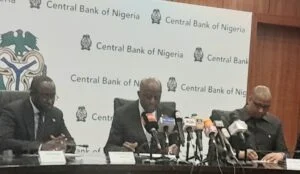The Monetary Policy Committee (MPC), of the Central Bank of Nigeria (CBN) has retained the country’s headline lending rate known as the Monetary Policy Rate (MPR) at 27 per cent.
In a communiqué issued at the end of the 303rd meeting of the MPC on Tuesday, the CBN Governor, Yemi Cardoso, said that members of the committee also voted to retain the Cash Reserve Ratio (CRR) at 45 per cent for commercial banks and 16 per cent for merchant banks.
Cardoso said that the MPC also retained the 75 per cent CRR on non TSA public sector deposits.
“Liquidity Ratio is also retained at 30 per cent, while Standing Facilities Corridor adjusted to +50 / -450 basis points around the MPR,” he said.
He said that all 12 members of the MPC attended the meeting.
According to him, the committee’s decision is underpinned by the need to sustain the progress made so far towards achieving low and stable inflation.
“The MPC reaffirmed its commitment to a data-driven assessment of developments and outlook to guide future policy decisions.
“It welcomed the continued deceleration in headline inflation year-on-year in October for the seventh consecutive month.
“This favourable development resulted from several factors, including sustained monetary policy tightening, stable exchange rate, increased capital flows, and surplus current account balance” he said.
The CBN governor said that the relative stability in the price of Premium Motor Spirit, (PMS), and improved food supply supported the pace of disinflation.
He, however, said that headline inflation remained high at double-digit, requiring sustained efforts towards moderating it further.
“The committee is, therefore, of the view that the steady deceleration in inflation across the three measures, headline, core, and food in October 2025 suggests that the large impact of previous tight policy measures is expected to continue in the near term.
“Maintaining the current stance of policy amid lingering global uncertainties would, thus, allow the effect of previous policy rate hikes to sufficiently transmit to the real economy and further reduce prices.
“Members noted the robust performance of the external sector, evidenced by the surplus current account balance and steady accretion to reserves, which have contributed to stability in the exchange rate and moderation in inflation,” he said.















